- From Faith Current: “The Sacred Ordinary: St. Peter’s Church Hall” - May 1, 2023
- A brief (?) hiatus - April 22, 2023
- Something Happened - March 6, 2023
Commenter @Hologram Sam found this item on Deadline from last October, and we’ve been talking about it a little on the Jann Wenner thread, so I thought it was worthy of its own post. Apparently the project teams the director of Dallas Buyers Club, Jean-Marc Vallée, with the screenwriter behind Bohemian Rhapsody.
I don’t envy them; like the failed Broadway musical, any authorized John and Yoko movie is going to be fighting itself—Yoko will insist that only a certain story will be put forth, but that story (in addition to being oft-told) isn’t actually that interesting. John and Yoko certainly felt their early courtship was full of conflict, including with “some of their beast friends,” but most of their troubles were of their own making—drugs, picking fights with hubby’s work friends, their pissed-off ex-spouses and neglected kids—and they handled them appallingly, deciding instead to stage a series of interesting, sincere but ultimately pointless political stunts. What external obstacles did they actually have to overcome?
I can think of one, which to me is the only reason to make a John and Yoko movie: sexism and racism. John and Yoko’s early years were blighted by the sexism of the Beatles’ circle (and the world in general), and by the anti-Japanese racism she suffered from fans. I am not a fan of John and Yoko’s self-mythologizing—I think it is so at variance with the truth as to be a manipulation—but if their myth gives heart to others facing this stuff, then it’s well worth putting up with another version of the Ballad of John and Yoko.
In addition to all the documentaries, and I can think of at least three (Imagine, The U.S. Vs. John Lennon, and Above Us Only Sky), there was 1985 made-for-TV movie John and Yoko: A Love Story. This has, I think, crossed over from fan-service into propaganda.
But for what? Will the new biopic talk about the things we endlessly chew over here on Dullblog? Will it show Yoko encouraging John to take heroin, or the pair of them zonked out for days not bathing, watching TV? Will Julian even appear? Or Kyoko? Will it show John’s alarming mental instability in the middle of 1968, his pointless viciousness towards his bandmates, or his disastrous friendship with Allan Klein (a friendship encouraged by Yoko)? Will it show Yoko speaking for John in meetings, ordering the other Beatles around in the studio, or John so dependent on Yoko that he demands that she accompany him into the bathroom? These lowlights were not all of the relationship; but we know we’ll be treated to the highlights, so it’s fair to ask.
Spoiler: it won’t. Anybody who’s seen Bohemian Rhapsody—the story of an equally beloved musical icon with a relationship history as murky and complicated as John Lennon’s—can tell you that it was cartoonish in its fan service. Freddie is a snaggle-toothed cutout moved through a series of plot-points. Queen gets together in the first 15 minutes; is immediately this supergroup; shrugs off small-minded producers and A&R men; faces some adversity when Freddie starts to cruise gay bars; Freddie gets HIV in a nightmarish red-hued sequence full of extras from Tom of Finland; falls into the clutches of an Evil Gay Boyfriend who just wants to use him; but through the love of his woman, Freddie gets it together long enough to do LiveAid, be accepted by his conservative dad, and die with dignity. That movie is only watchable thanks to a marvelous performance by Rami Malek. It’s possible that this project will be equally blessed by the right casting…but I wouldn’t bet on it.
I’ve said many times that the world deserves a really good Yoko Ono biography, but that I doubt we’ll get one. She is outliving her biographers, and she’s dedicated to image control; the message discipline here is worthy of any political campaign. But as with the Peace Campaign of 1969, the problem is that once you scratch the surface, there really is no coherent message—it’s just publicity for Celebrity Couple, John and Yoko. When John was a Beatle, that was interesting; there was something fascinating and durable behind all the posturing to keep our attention. But as he aged and became to rock music what Truman Capote was to letters—a once-essential artist who became so enmeshed in his own image that his productivity sputtered and stopped—there wasn’t anything that arresting about John or Yoko, much less John and Yoko. Since Lennon’s murder, the story contains the inherent drama of looming tragedy…but even so, there isn’t enough here to carry a film—unless you get down to the real nitty-gritty. Yes, there’ll be a wife-beating scene, and probably a John-is-bi-curious one, too—but Yoko will remain through it all the long-suffering Genius Art Grandma, holding herself at arm’s length, or further if possible. And that’s a shame because her story is the one that’s yet to be told, and if we knew more about Yoko—not what she wants to show us, but the whole thing—we could connect. We could love Yoko; but she wants worship. To be honest, if I’d gotten the treatment she did in the early years, I’d probably feel the same way.
Those who are already invested in the Ballad—I’m reminded of the woman at Beatlefest who told me “they are my religion”—will be delighted by this new John and Yoko movie; but the rest of us are probably in for a rougher ride.

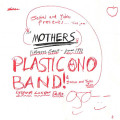
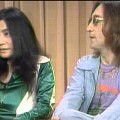
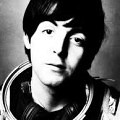
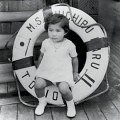
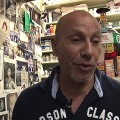
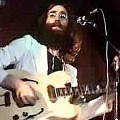
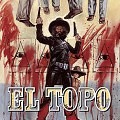
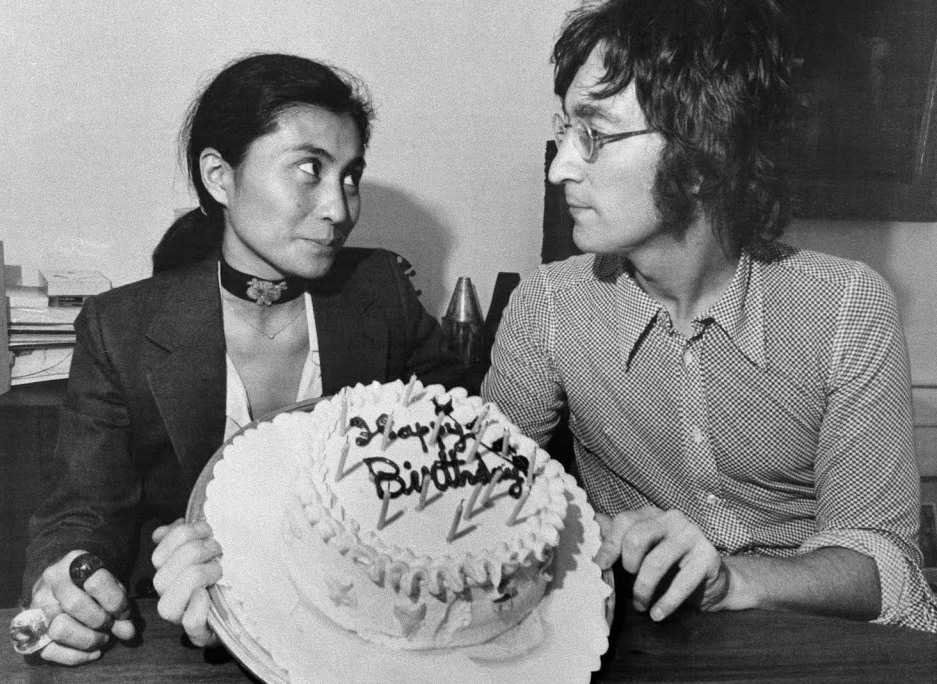
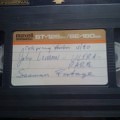
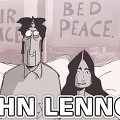
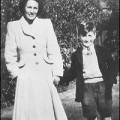
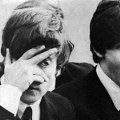
Oof. The official version of the Ballad barely even works as a story—it’s all telling, no showing. We have so many anecdotes reflecting the genuine love that J/P/G/R had for each other that aren’t contradicted or undermined by competing accounts. Off the top of my head, I can’t think of anything similar for J&Y. Maybe that John took the rap for their 1968 pot bust? But if he hadn’t, she could’ve been deported, so there was self interest at work. Everything else requires the audience to view creepy codependency as love, to trust that John was happier when his behavior and appearance suggested he was more unhappy, and to believe that a healthy romance is one that requires its participants to shut themselves off from the world and from their own pasts. The Ballad won converts because of John’s facility with words AND his audience’s desire to believe. Without the former element, this will only be compelling to the converted, I suspect.
What’s interesting to me is just how compelling the ballad seems to be! For a certain type of person, this story is catnip. Why is that, I wonder? I’m not sure if people under 40 care overmuch about John Lennon and Yoko Ono‘s marriage. But a significant number of people in the boomer generation definitely do.
That’s interesting. I’m a ways under 30, and to the extent I hear Johnandyoko come up, it’s usually as something of a joke—this kooky, codependent couple. I think people assume they loved each other and that the marriage was basically happy (the Lost Weekend isn’t well remembered), but I don’t see them being thought of as a love story. More like, god the sixties got really weird by the end.
Under 40! Wishful thinking
My experience with my 20 something nephew and those in his age bracket that love The Beatles, is the same. John and Yoko were weird. Period.
My nephew has pointed out to me that the “Something” video is really telling.
George and Patti look great, Patti is hot.
Ringo and Maureen are riding dirt bikes, having fun.
Paul and Linda are romping through the Scottish countryside with Martha.
John and Yoko are wearing black robes and look like they’re dressed up for Halloween.
I’m still just about under 30 and my generation mostly views John as a wife-beater, hypocrite and all-round bad dude. This trend is visibly increasing as people ten years younger than me start to come of age, which makes sense given that they’re far more politically engaged – particularly on feminist issues – than Gen Xers ever were and hold their heroes to far more stringent standards. (Incidentally, I’ve always felt we 1990 kids to be stuck in a weird halfway house between Xers and full-blown millenials. Bush got people politicised but what we’re seeing now is a different level.) So it seems that in the space of our collective generations John’s gone from being worshipped to being laughed at to being almost reviled.
.
Having a bit of a reactive streak, I’ve sorta taken on the mantle of Defender of John in recent years, e.g. in Starostin’s fan group where Paul’s music is routinely held in higher esteem. (Ironically Starostin prefers John.) As you can see, I occasionally chime in on his behalf here too. Obviously I don’t condone his bad behaviour, but I feel the backlash has swung too far to the other side of the pendulum when people start to diminish the man’s art. (Not accusing you fine people of this by the way; you’re not claiming that George was a better songwriter or pitting J&P’s solo albums against each other in polls!) Downgrading a genius’ achievements does a disservice to art, culture and, well, the truth, and only impoverishes people as listeners.
.
But nowhere is the impossibility of completely separating the artist from the art more apparent than with the Beatles: people’s favourite Beatle has always been their favourite both personally AND musically. I think this is partly down to people transferring qualities from one category to the other, and partly down to the fact that the music you write really does reflect who you are. Interesting, then, that I’ve always slightly favoured John’s work while preferring Paul as a person – I don’t lightly forget how badly Anthology’s account of the three-against-one days of 1969 affected me at 13. I think this seeming cognitive dissonance can be explained by the fact that art conveys qualities of a person’s soul that are often obscured by most of their actual behaviour.
.
Tolkien: ‘For myself, I find I become less cynical rather than more – remembering my own sins and follies; and realise that men’s hearts are not often as bad as their acts, and very seldom as bad as their words.’
.
I have a theory on the main factors driving society’s 50-year-long switch from “John was 3/4 of the Beatles” to “Paul’s carpool karaoke was the pinnacle of TV” but it’d take a post to elaborate on it!
What I’m curious about, is if the director would talk to Paul and Ringo. They are first hand witnesses. Then the issue is, would their viewpoint make it in the film?
From what I’ve read, Paul has made peace with Yoko, and the Beatles Co., is equal between Paul, Ringo, Yoko, and Olivia Harrison. Anything Beatle related must be done by unanimous decision.
I realize John and Yoko’s story isn’t really a Beatles story, but the fact remains that Yoko was a big factor in the breakup, and was there in the studio from the White Album on.
So how does this get portrayed, without stirring the pot?
Is Yoko going to upset the balance again?
Harassment and spying from the U.S. government? Death threats? People have been driven to suicide from what Lennon endured (see: Seberg, Jean).
When I first read about this film project I had a brief and crazy notion that maybe, after all these years, Ono finally said “Fuck it, I’m old. Time for the truth.” But that moment passed quickly.
If cannabis is legalized in my state by the time this movie is released, maybe I’ll munch a big edible and take in a matinee, just to let the music and images wash over me. But I know it’ll probably make Yesterday look like a documentary.
@Sam, point well taken about the government harassment. Though I will say that Lennon courted it. Not saying it was in any way for the FBI/CIA to harass John and Yoko; just that their martyr complexes made them run towards the harassment, rather than away from it. (Support of Michael X, John Sinclair, etc.) It probably bonded the couple, don’t you think?
@Michael G., re: “What’s interesting to me is just how compelling the ballad seems to be!”
The myth of the male-female romance in this culture is strong, especially “woman saves man” … from working too hard, losing his soul, addiction, etc.
The bond between the Beatles is harder to get one’s conditioned mind around. The kind of love and the form of intimacy of that kind of communion.
@Chris, I think you’re really into something here. Wouldn’t it be interesting if The Beatles’ most important contribution to romance isn’t all the love songs, but demonstrating the love between four friends? As work changes, the monogamous pair bond as primary economic unit of society seems likely to shift. Will it shift to small tribes? There is something tribal about The Beatles.
@Michael G., the bond between them is a beautiful thing. By all accounts, they were an impregnable band of brothers. I get the impression the sense of kinship–of Us-Them–within the Beatles is unrivaled by any other band or group of artists, period. Even those closest to the group–Mal, Neil, Brian, George M–felt left out of that four-person unit. As though they were soldiers, but united not by destruction but by creation. The love between them had to be part of the magic of the music they made. (And also of the bitterness of the break-up.)
@Chris, I love this!! I think you have articulated why the fascination with the Beatles endures to this day.
My comment options are wonky so I’m not sure if I’m replying inline or not.
@Tasmin: I think Paul probably knows at this point what a Yoko-sanctioned film is going to say. I suspect that the movie isn’t going to say anything he hasn’t heard a billion times before—that the Beatles weren’t kind to J&Y, that they took heroin because of their “beast friends,” that John found the collaborator of a lifetime in Yoko, etc., etc. I’m sure it’s still very hurtful to Paul, but it seems like in the last few years, he’s started to reach a certain peace with his memory of John. His comments in recent interviews suggest that he finally realizes that John really loved him, and that John was a scared and troubled person.
@Michael G.: Not only did the Lennons seek persecution, they pretty much fell apart once they weren’t seeking martyrdom as a couple (post-1972). That victim complex bonded them, and I think once John’s and Yoko’s respective instincts to be the victim in any given situation turned from facing the outside world to facing each other, they were doomed to have trouble. And it was inevitable that they would eventually go from looking at the other person as a rescuer to other person as persecutor—it was surely in John’s nature, and it seems to have been in Yoko’s, too. I think that was only going to get more intense had John lived.
I think the ballad is compelling to people who over identify with or are overly invested in Saint John Lennon, and are fearful of the truth because confronting it would cause them to, well, lose their own fantasies. People swallow Yoko’s bullshit because they want to – no one really wants to know the truth about their idols. That’s why Fred Seaman was so easy to discredit. It’s because no one wanted to believe it.
The biggest problem I have with the ballad is not just that it’s a lie (though clearly that’s an issue when it’s being sold as the truth in a feature film where the audience won’t question it), but it’s also exploitative. I accept that John allowed Yoko to control his image and that he gave her a power of attorney to do whatever she wanted with ‘John Lennon’, the brand. But John Lennon is not just a brand, he was also a person, and it really isn’t clear that he was of sound mind when he signed his life over to Yoko. He was also surrounded by some very bad and dangerous individuals (people like Phil Spector, Sam Green), and we don’t know to what extent he was afraid.
What we do know is that he kept a diary and that whatever he wrote in it, Yoko does not want the world to see. Now, John might have been weak and vulnerable and not of sound mind, but he wasn’t stupid. He employed Fred Seaman knowing that Seaman had studied journalism, and told him about the diary. He had to have known that Seaman would try to steal it.
My point is – we don’t know whether John was invested in the ballad at all, or whether it was something he went along with because he was weak and vulnerable, or because he was in a situation where he was afraid not to. And while people continue to dismiss the likes of Seaman or Pang, or anyone else who dares to speak out, as “disgruntled” or “unreliable”, and the Estate continues to bankroll films and pay journalists to peddle the myth, we will never know the truth. And that is such a betrayal of John.
This is a point I have thought of many times myself. It is an unhappy ending to a story we all wish ended better–but @Elizabeth, it’s at least as defensible a reading of what we know as the conventional narrative, and maybe more so.
.
For the record, I believe Fred Seaman and May Pang. Neither of them have gotten rich off John Lennon–they’ve made a bit of money, but not nearly as much as if they’d shut up and played ball with the Estate. And they knew exactly what they were in for, but said what they had to say. Is theirs the only truth? Probably not. But I do not think you can dismiss them. In the case of Fred Seaman, his association with Lennon has gotten him nothing but grief. And the idea that assistants are “disgruntled” or “want to be important”–that justification is always in the mouths of rich, famous, and powerful people with stuff to hide. Fred Seaman would’ve made ten times as much money if he’d written a version of the ballad, because that’s what was selling in the 1980s and 90s. And people who don’t like John Lennon won’t buy books about him. His motives for writing his book might not have been totally pure–only he would know–but I don’t think anybody honestly thought that manuscript was going to sell 100,000 copies, much less a million.
[…] @Justin wrote this morning about John Lennon’s lousy reputation among younger Beatle fans, and the concomitant rise in […]
I believe Seaman too, and I don’t think that Yoko would have gone to the lengths that she did to recover the diaries from him had their contents not been explosive, and very damaging to her.
I think John wanted to set the record straight. If he’d been that invested in the ballad, his diaries would have been hidden away and Seaman wouldn’t have known about them.
I’ll go further than that. If the diaries weren’t an absolute cataclysm, they would’ve been repackaged and sold. The Estate was doing all sorts of things like that in the early and mid-80’s (Skywriting By Word of Mouth).
To draw yet another parallel between the Beatles and Buddy Holly (something I do here often), I recently learned a new movie is in the works about the bespectacled singer/songwriter from Lubbock:
.
Buddy fans who are very online are complaining bitterly about Holly’s widow being involved in this production. The fans claim his widow has misrepresented the final months of his life, as well as their relationship, and that the movie will therefore be an inaccurate portrayal of their hero.
Sort of like the upcoming John&Yoko biopic.
I’m a Buddy fan, but I generally keep out of those discussions. I prefer to analyze his music to death, and obsess over the hunt for missing TV footage.
I’ll probably pay to see both the John&Yoko movie and the Buddy movie, but I’ll spend my money skeptically. (As if the producers care.)
Really interesting parallel, Sam. Will be interesting to see what that Buddy Holly movie is like — I’m originally from Texas, so Mr. Holly is particularly dear to my heart!
Nancy, Phillip Norman wrote a teleplay about Buddy Holly called Words Of Love. Of course, Norman being Norman, he includes a lonely British schoolboy (based on Norman) and we flash back and forth between his struggles and Buddy’s doomed last tour.
.
The guy who portrays Buddy is pretty good. It’s a rather decent BBC2 production overall.
https://www.youtube.com/watch?v=yaPQ26RXsFs